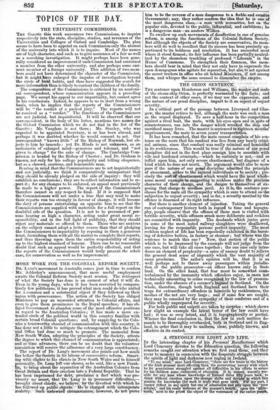TOPICS OF THE DAY.
THE UNIVERSITY COMMISSIONS.
Tan Gazette this week announces two Commissions, to inquire respectively into the state, discipline, studies and revenues of the Universities and Colleges of Oxford and dambridge. The plan seems to have been to appoint on each Commission only the alumni of the university into which it is to inquire. Most of the names are of high character, and such as to give assuranceof a fair as well as a, searching investigation. It might perhaps have been gene- rally considered an improvement if each Commission had contained a member from the other university, and also perhaps some emi- nent member of a,foreign university. This addition of two mem- bers could not have determined the character of the Commission, but it might ily° enlarged the impulse . of investigation beyond the circle of lorld habits, and thus have suggested the search for more informatiai than is likely to content the children of the family. • The composition of the Commissions is criticized by an. academi- cal correspondent, whose communication appears in a preceding page. We accept his appeal to our impartiality, but cannot agree in his conclusions. Indeed, he appears to us to start from a wrong basis, when he implies that the reports of the Commissioners 'will be "the verdict of a packed jury." The reports will not be received as a "verdict." The functions of the Commissioners are not judicial, but inquisitorial It will be observed that our correspondent, in the body of his letter, mentions two names for the Oxford Commission which we do not find in the list of the Gazette : Mr. Vaughan is not there ; Mr. Stanley, who was 'expected to be appointed Secretary, is or has been abroad, and perhaps it was doubted whether he would consent to art. Ow correspondent "knows little" of the Bishop of Norwieh, but ob- jects to him by inuendo : yet Dr. Hinds is not unknown, as an ecclesiastic of enlarged mind—generous and tolerant, and "not given to change" for the sake of change. The Cambridge Com- mission is headed by the Bishop of Chester ; and Dr. Graham is
,known, not only for his college popularity and •telling eloquence,
>butes a shrewd, cautious, and honourable man.
Bearing in mind that the Commissioners are to act inquisitorially ,3and.: not judicially, we think it comparatively unimportant that they' should be already, pledged on the side of inquiry : they will
. -establish no conclusions; they are to collect information and to re- port it ; for any changes to be enforced, an appeal must previously be made to a higher power. The report of the Commissioners therefore cannot an any respect be final If it is supposed that the Commissioners will act under a bias that may tend to make their reports run too strongly in favour of change, it will become the duty of persons entertaining an opposite bias to see that the Commissioners are supplied with materials for a full report on the doubtful side of the question. It is not to be presumed of per- sons bearing so high a character, acting under great moral re- sponsibility, and in the full light of publicity, that they should reject any materials so offered to them. Those who are anxious • on the subject cannot adopt a better course than that of pledging the- Commissioners to impartiality by reposing in them a generous trust, furnishing them with all the matter to complete their reports, and thus throwing upon them the entire responsibility of acting up to the highest standard of honour. There can be no reasonable -doubt that such an appeal would be perfectly effectual, and that the reports of the Commissioners would truly present the whole ease, for conservation as well as for improvement.


























 Previous page
Previous page